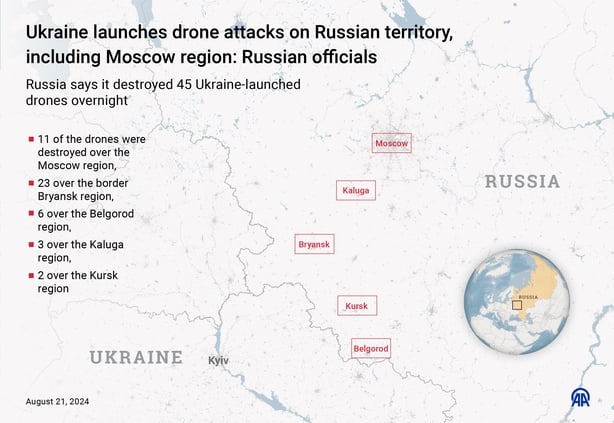Ukraine launched one of the largest ever drone attacks on Moscow, the city's mayor said, with Russian air defence units destroying all 11 drones flying towards the capital.
Some were downed over the city of Podolsk 38km south of the Kremlin, Moscow's Mayor Sergei Sobyanin said.
"The air defence systems of the defence ministry continue to repel enemy UAV (unmanned aerial vehicles) attacks," he posted on the Telegram messaging app, adding that no damage or casualties had been reported.
"This is one of the largest attempts to attack Moscow using drones ever. We continue to monitor the situation."
The attack on Moscow was part of a broader drone assault.

In total, 45 drones were destroyed by the Russian air defense systems, according to the its defense ministry, while Ukrainian defences reported stopping 50 Russian drones and a guided missile, out of 72 'air targets' it had identified.
Kyiv was one of the locations targeted.
Ukraine has often launched one or two drones targeting Moscow in recent months, causing little damage.
In May, Russia said that it had downed a drone outside the capital, forcing restrictions to be imposed at two major airports in the city for under an hour.
The substantial wave of drone attacks overnight comes amid a Ukrainian offensive in Russia's Kursk region, which Kyiv has said is aimed at bringing the campaign launched by Russia in February 2022 closer to an end on "fair" terms.
We need your consent to load this rte-player contentWe use rte-player to manage extra content that can set cookies on your device and collect data about your activity. Please review their details and accept them to load the content.Manage Preferences
Russia presses its advance in Donetsk
Since 6 August, Ukraine has mounted an unprecedented cross-border assault into Russia's Kursk region, where it claims to control more than 80 settlements.
Further south, Russian forces have taken control of the settlement of Zhelanne, near the strategically important city of Pokrovsk, as Russia presses forward in its bid to complete its control of the eastern Donetsk region, Russia's defence ministry said.
Pokrovsk, a vital transport hub for Ukrainian forces located at the intersection of key supply routes, is being evacuated.
Taking the city is a long-standing goal for Russia, and its forces have advanced more in recent weeks than they have in the previous two years.
Kyiv has also repeatedly targeted oil and gas facilities in Russia since the conflict began in 2022, some hundreds of kilometres from its borders, in what it has called "fair" retaliation for massive attacks on its energy infrastructure.
Ukrainian drones attacked an oil storage facility in Russia's southern Rostov region on Sunday, sparking a large fire, the local governor said.
The blaze in the city of Proletarsk is still raging, Russian media reported today.
Earlier this month, Ukrainian President Volodymyr Zelensky praised his forces for hitting oil facilities in Russia, saying the attacks would help bring a "just end" to the conflict.
War crimes, and controversial exemptions
Ukraine's parliament today voted to join the International Criminal Court (ICC), as Kyiv seeks to bring Russia on charges over war crimes it is alleged to have committed throughout its invasion.
The ICC prosecutes grave offences like genocide and crimes against humanity, and has the power to issue arrest warrants that its 124 members are obliged to execute.
Ukraine signed the Rome Statute that founded the court in 2000, but did not ratify it, with some political and military figures expressing fears that Ukrainian soldiers could face prosecution.
Today's ratification controversially included a reference to Article 124 of the Rome Statute, which would exempt Ukrainian citizens from being prosecuted for war crimes for seven years, an MP from the ruling party, Yevgeniya Kravchuk, said on Facebook.
"The ratification of the Rome Statute will simultaneously facilitate greater opportunities for punishing Russians and increase the isolation of Russia," she said.

